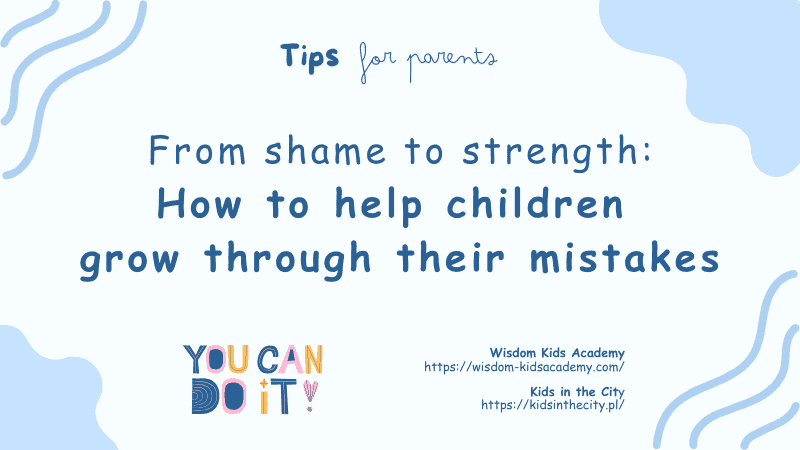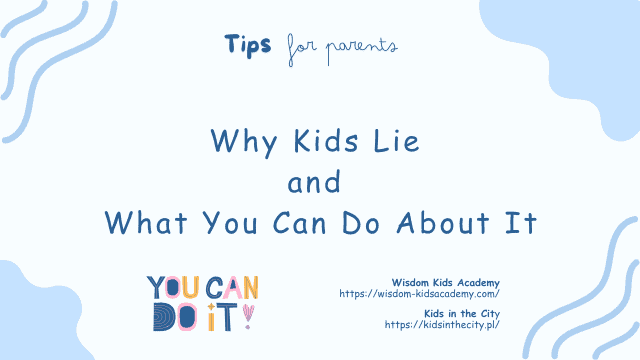Limor Jasinski, a Mindset Coach for Kids and Teens based in Warsaw, the founder of Wisdom Kids Academy, on why kids lie and how to encourage truth-telling
If you’re a parent dealing with a child who lies—sometimes about the big things, sometimes about the small things, and maybe a little too often—this article is for you.
Maybe your child insists they brushed their teeth when the toothbrush is bone-dry. Or they claim homework is done when it’s nowhere near. If you’re nodding right now, you’re not alone.
I’ve been there. As a mom, I’ve faced those moments where I’m looking my child in the eyes, knowing the truth, while they’re confidently saying the opposite. One of my boys went through a stage where lying became his automatic reaction—even over things that didn’t need to be hidden. And as a mindset coach for kids and teens, I knew I needed to help him develop stronger internal skills, not just correct the surface behavior.
That’s why I’m writing this—to shed some light, clarity, and tools that worked in our home and my coaching practice with other children. I’ve seen these strategies help not only my boys but also the kids and teenagers I coach every week.
Why Do Kids Lie?
Lying is actually quite common among children. It’s often less about being “bad” and more about avoiding discomfort, pleasing adults, or getting to the fun stuff faster.
Now, children with ADHD may lie more impulsively—not because they’re intentionally deceitful, but because their brains are wired for immediacy and avoidance. They tend to act first, think later. A child with ADHD might lie because:
– They forgot what they were supposed to do.
– They want to avoid a boring or difficult task.
– They’re chasing a dopamine hit (like getting to screen time faster).
But whether your child has ADHD or not, the solution lies in the same place: building trust, accountability, and a family culture that makes honesty feel safe and rewarding.
How We Shifted the Lying Habit in Our Home
What changed things for us was shifting the focus from punishing lies to praising truth. We started rewarding honesty in small, consistent ways—and it worked.
Here’s what we did:
We created an Honesty Sticker Chart.
For every honest moment—whether it was a child telling the truth even when it was hard, or choosing to show me that something was done instead of just saying it, they earned a sticker.
At first, it was just about collecting stickers. Then, once they earned 20, they received a small reward, like extra playtime, a fun budget game they wanted, or choosing a dessert after dinner.
It wasn’t about rewards for the sake of rewards. It was about reinforcing values. We were showing them that honesty leads to trust, appreciation, and positive outcomes. Slowly, the lying decreased, and the pride in being truthful grew.
4 Practical Strategies to Encourage Truth-Telling
Here are four tools I recommend to any parent facing this challenge:
1. The “Show, Don’t Tell” Rule
Instead of asking “Did you do your homework?” or “Did you shower?” we switched to:
“Great—show me!”
When you take the guesswork out of truth vs. lie, you create clarity and reduce the temptation to lie. This isn’t about policing—it’s about building trust through action.
2. Reward Honesty (Even the Small Stuff)
Praising honesty—even in the smallest moments—helps kids feel safe to tell the truth. Try saying:
“Thank you for telling me that—even though it was hard. That was really brave.”
And yes, bring in a sticker chart like we did. Keep it fun and light. Make it about teamwork, not pressure. You’re building a new habit.
3. Talk About Why Truth Matters
Sometimes, kids lie simply because they don’t understand the impact. During a calm moment, have a heart-to-heart.
Explain:
“When you lie, even about little things, it makes it hard for people to believe you later—even when you’re telling the truth. But when you’re honest, it helps us trust you more, and you feel proud of yourself.”
You can even use a visual example:
One day, I showed my kids two strings—one smooth and one tangled. I told them:
– “Telling the truth keeps life smooth and simple.”
– “Lying makes things tangled and messy—and it takes longer to fix.”
This helped them see what I meant, not just hear it.
4. Use Calm, Natural Consequences
Instead of harsh punishments, stick with logical consequences.
If your child lies about showering, have them do it again immediately.
If they lie about homework, let them experience the school consequence, and then support them in fixing it.
Natural consequences teach accountability without creating shame. And when combined with praise for honest moments, they help kids choose differently next time.
When to Seek Professional Help
If lying becomes persistent and is accompanied by other behavioral issues, it may be time to consult a professional. Therapists, counselors, or a mindset coach for kids like me, can provide tailored strategies and support for both the child and the family.
Final Thoughts
Lying is a behavior that, while common, can be addressed effectively with patience, understanding, and consistent strategies. By fostering an environment that values honesty and supports open communication, parents can guide their children toward more truthful interactions.
Every child is unique, and what works for one may not work for another. Stay attuned to your child’s needs, and don’t hesitate to seek support when necessary.
Remember, you’re not just correcting behavior, you’re teaching integrity and raising a leader.
About the Author
Limor Jasinski – the founder of Wisdom Kids Academy in Poland, and a fervent advocate for children’s development. A Tel Aviv native, Limor’s journey in nurturing young minds began early in her career when she worked as a caretaker for children, revealing her innate connection with them. This connection sparked a lifelong passion that led her across continents, from the welcoming communities of Canada to the enchanting landscapes of Poland and Warsaw.
Limor holds over a decade of experience in coaching, starting with her certification from TUT Coaching College and followed by advanced training at the Robbins-Madanes Training program in the U.S. She further honed her skills by earning a Practitioner of Excellence certificate from The Strategic Intervention Coaching Institute and becoming a certified Wisdom life coach for kids through Adventures in Wisdom.
At Wisdom Kids Academy, Limor uses the WISDOM System for Coaching Kids™, a part of the Adventures in Wisdom™ Curriculum. This innovative program, which includes 27 specially designed books, has been adopted by life coaches in over 30 countries to develop personal growth and leadership skills in children and teens. Limor’s curriculum focuses on essential life skills like resilience, self-esteem, and overcoming fears through compelling storytelling, enabling kids to confidently face life’s challenges.
Limor takes pride in her role as a coach, inspiring greatness and encouraging each child to dream big and develop a robust mindset for overcoming any obstacle. Under her guidance, children at Wisdom Kids Academy embark on a transformative journey of growth and discovery, unlocking their potential and achieving their goals with confidence and excitement. Connect with Limor: limor@wisdom-kidsacademy.com, Instagram, Facebook. Wisdom Kids Academy’s website in English.
Wisdom Kids Academy’s services
Explore our full range of offerings and real-life success stories on our website: wisdom-kidsacademy.com. Interested in personalized coaching or engaging workshops for schools and parents? We cover various topics of growth mindset, such as Strengthening Self-Confidence and Making Good Decisions. How do you instill values and self-responsibility at home? Visit us to learn more and share your experiences. Together, let’s enrich our parenting skills and empower our children for a brighter future!


















